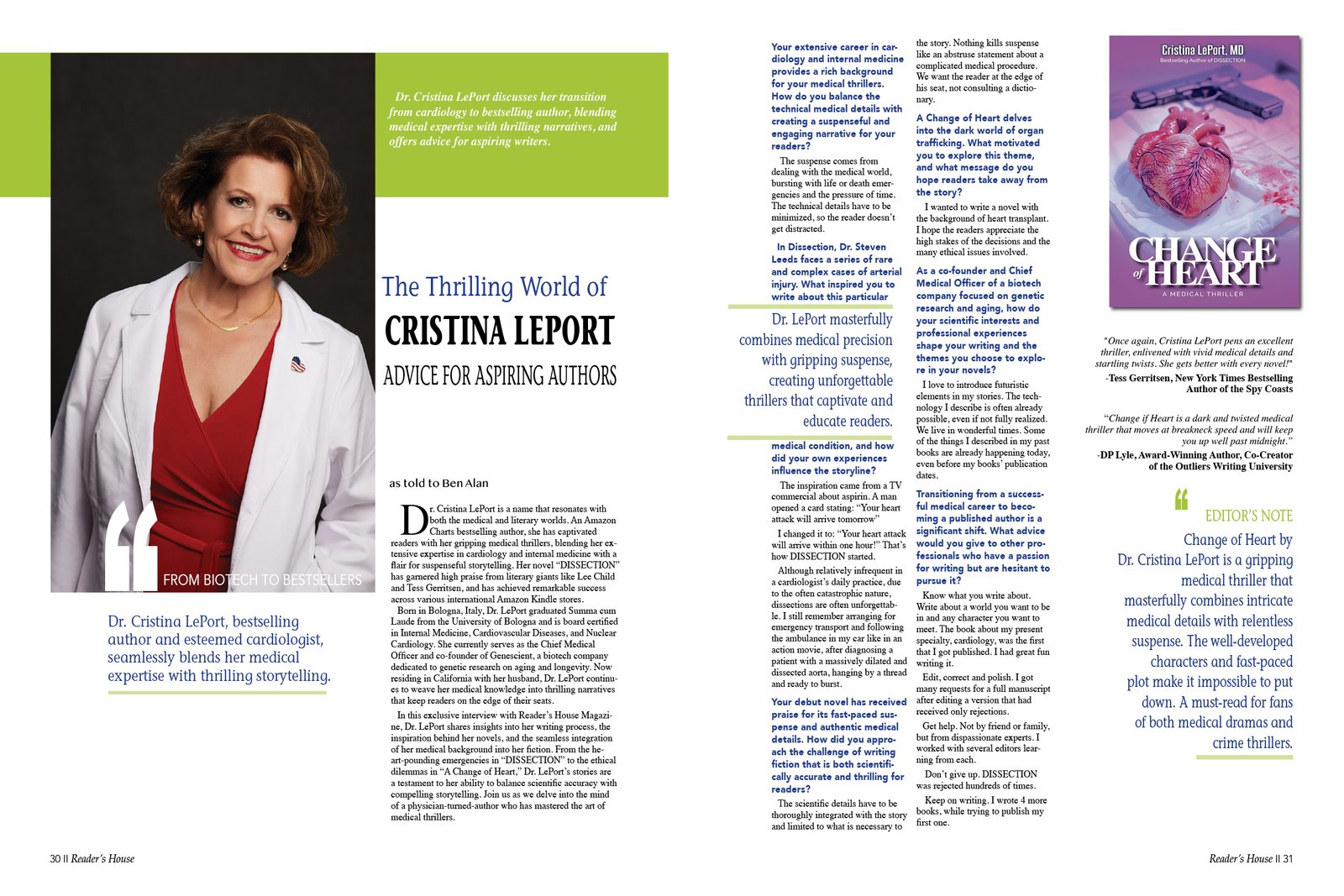Advice for Aspiring Authors
Dr. Cristina LePort discusses her transition from cardiology to bestselling author, blending medical expertise with thrilling narratives, and offers advice for aspiring writers.
Dr. Cristina LePort is a name that resonates with both the medical and literary worlds. An Amazon Charts bestselling author, she has captivated readers with her gripping medical thrillers, blending her extensive expertise in cardiology and internal medicine with a flair for suspenseful storytelling. Her novel “DISSECTION” has garnered high praise from literary giants like Lee Child and Tess Gerritsen, and has achieved remarkable success across various international Amazon Kindle stores.
Born in Bologna, Italy, Dr. LePort graduated Summa cum Laude from the University of Bologna and is board certified in Internal Medicine, Cardiovascular Diseases, and Nuclear Cardiology. She currently serves as the Chief Medical Officer and co-founder of Genescient, a biotech company dedicated to genetic research on aging and longevity. Now residing in California with her husband, Dr. LePort continues to weave her medical knowledge into thrilling narratives that keep readers on the edge of their seats.
In this exclusive interview with Reader’s House Magazine, Dr. LePort shares insights into her writing process, the inspiration behind her novels, and the seamless integration of her medical background into her fiction. From the heart-pounding emergencies in “DISSECTION” to the ethical dilemmas in “A Change of Heart,” Dr. LePort’s stories are a testament to her ability to balance scientific accuracy with compelling storytelling. Join us as we delve into the mind of a physician-turned-author who has mastered the art of medical thrillers.
Your extensive career in cardiology and internal medicine provides a rich background for your medical thrillers. How do you balance the technical medical details with creating a suspenseful and engaging narrative for your readers?
The suspense comes from dealing with the medical world, bursting with life or death emergencies and the pressure of time. The technical details have to be minimized, so the reader doesn’t get distracted.
In Dissection, Dr. Steven Leeds faces a series of rare and complex cases of arterial injury. What inspired you to write about this particular medical condition, and how did your own experiences influence the storyline?
The inspiration came from a TV commercial about aspirin. A man opened a card stating: “Your heart attack will arrive tomorrow”
I changed it to: “Your heart attack will arrive within one hour!” That’s how DISSECTION started.
Although relatively infrequent in a cardiologist’s daily practice, due to the often catastrophic nature, dissections are often unforgettable. I still remember arranging for emergency transport and following the ambulance in my car like in an action movie, after diagnosing a patient with a massively dilated and dissected aorta, hanging by a thread and ready to burst.
Your debut novel has received praise for its fast-paced suspense and authentic medical details. How did you approach the challenge of writing fiction that is both scientifically accurate and thrilling for readers?
The scientific details have to be thoroughly integrated with the story and limited to what is necessary to the story. Nothing kills suspense like an abstruse statement about a complicated medical procedure. We want the reader at the edge of his seat, not consulting a dictionary.
A Change of Heart delves into the dark world of organ trafficking. What motivated you to explore this theme, and what message do you hope readers take away from the story?
I wanted to write a novel with the background of heart transplant. I hope the readers appreciate the high stakes of the decisions and the many ethical issues involved.
As a co-founder and Chief Medical Officer of a biotech company focused on genetic research and aging, how do your scientific interests and professional experiences shape your writing and the themes you choose to explore in your novels?
I love to introduce futuristic elements in my stories. The technology I describe is often already possible, even if not fully realized. We live in wonderful times. Some of the things I described in my past books are already happening today, even before my books’ publication dates.
Transitioning from a successful medical career to becoming a published author is a significant shift. What advice would you give to other professionals who have a passion for writing but are hesitant to pursue it?
Know what you write about. Write about a world you want to be in and any character you want to meet. The book about my present specialty, cardiology, was the first that I got published. I had great fun writing it.
Edit, correct and polish. I got many requests for a full manuscript after editing a version that had received only rejections.
Get help. Not by friend or family, but from dispassionate experts. I worked with several editors learning from each.
Don’t give up. DISSECTION was rejected hundreds of times.
Keep on writing. I wrote 4 more books, while trying to publish my first one.



